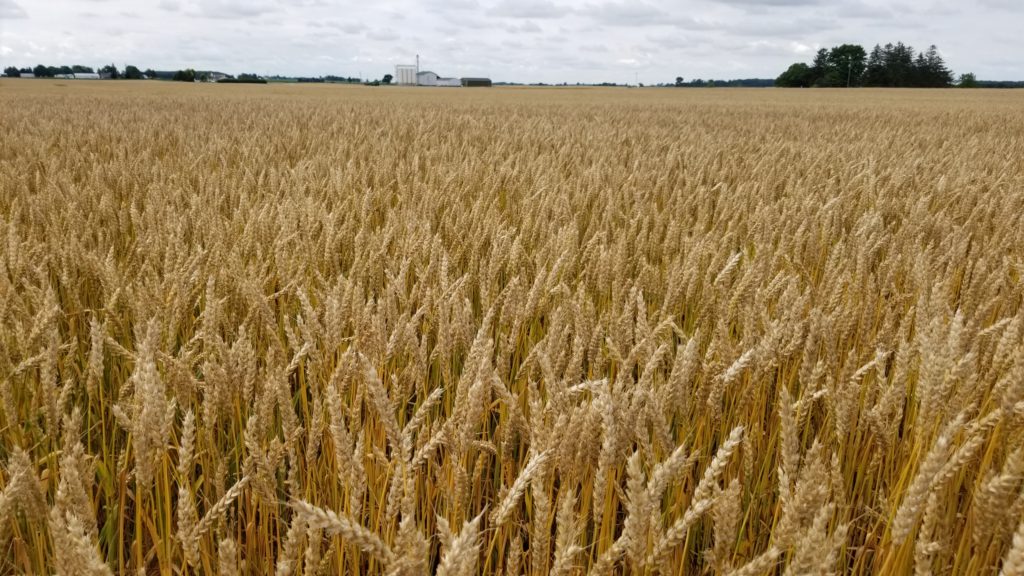 Lansing, Mich. (Aug. 7, 2023) – A vital piece of the Michigan Wheat Program’s research agenda was just released with publication of the 11th consecutive year of high-management wheat research trials.
Lansing, Mich. (Aug. 7, 2023) – A vital piece of the Michigan Wheat Program’s research agenda was just released with publication of the 11th consecutive year of high-management wheat research trials.
For over 30 years, Michigan State University has been conducting Wheat Performance Trials. And for the last 11 years, the Michigan Wheat Program has provided funding and resources to include a high-management component to the trials, which includes additional nitrogen and fungicide inputs.
Farmers intending to plant wheat this fall should consult the report to learn more about the 69 varieties tested across Michigan and review the side-by-side results for these varieties under conventional and the high-management approach, according to MSU wheat systems specialist Dennis Pennington. Pennington completed harvest of the plots in early August and finalized the report with assists from MSU wheat breeder Dr. Eric Olson and Amanda Noble, Assistant Wheat Breeder.
“The Michigan Wheat Program believes that high-management practices will be increasingly important for Michigan wheat growers in the years to come,” said Jeff Krohn, chairman of the nine-member Michigan Wheat Program board and a wheat farmer in Owendale. “As we saw last year and in years past, high-management production practices usually result in increased yields for most of the varieties enrolled in the Performance Trials.”
“This report provides a wealth of information for farmers looking to improve the bottom-line of their wheat crop,” Krohn said. “The key is to find the varieties that work best for you and consider input costs along with what works best with your management practices.”
As a part of management practices Olson recommends, “”Michigan wheat growers face unique challenges each year. In 2023, many areas of the state were affected by drought during crop development. Growers can manage year to year variables like drought and disease pressures by planting multiple wheat varieties on their farms.”
The 2022-2023 high-management research trials took place in eight locations in seven Michigan counties: Hillman, Huron, Ingham, Isabella, Monroe, Sanilac and Tuscola. The Hillman site was not harvested this year due to weather-caused poor yields.
The Tuscola and Isabella sites allowed side-by-side comparison across all 69 commercial varieties of the high-management vs. conventional management approaches. At the MSU Saginaw Valley Research & Extension Center (SVREC) in Tuscola County, 64 varieties yielded more bu./acre under high management treatment while 5 seed varieties yielded less to slightly less. At the Isabella County location (Hauck Seed Farm), 57 varieties yielded more under high-management cultivation, while a dozen varieties yielded less. The average increase under high management practices was 7.8 more bu./acre in Tuscola and 5.7 bu./acre more at the Isabella County site.
At SVREC, 11 varieties in high-management test plots showed an increase of more than 12 bu./acre. At Isabella, seven varieties had greater than 12 bu./acre gain under high management. Consult the full report via the Michigan Wheat website at www.miwheat.org to learn more about test weight, yields and moisture content at harvest for each variety.
“While we now have 11 years of experience with these side-by-side trials and generally positive results, every wheat farmer should study the results, consider the additional input costs and consider how these varieties might perform at their particular farm location,” Pennington said. “The goal of this project is to build a body of data for growers to consider when making the next year’s planting decisions.”
While this study helps wheat farmers, it also is vital to Olson and his breeding program. “Rain at harvest led to some preharvest sprouting issues. With support from the Michigan Wheat Program, MSU wheat breeding and genetics is able to evaluate all commercially available wheat varieties for Falling Number as well as visual sprouting to help make the best possible variety selection decisions. ” By culling those not as performing well, Olson is able to keep the best of the best and continue to breed robust, high-performing varieties.
The 2023 Performance Trials included 69 commercial wheat varieties developed by 11 different organizations, including private sector seed companies, the Michigan Crop Improvement Association and Michigan State University.
Wheat trial details
During the 2022-2023 growing season, research plots were planted on privately-owned farms as well as SVREC, the MSU Mason Research Farm and MSU’s Fusarium Head Blight Nursery in Lansing. New as a trial location this year was Michigan Wheat Program Board member Brad Kamprath’s farm in Ida.
Farms hosting the 2022-2023 trials included:
- Hauck Seed Farm of Rosebush (Isabella County)*;
- Darwin Sneller of Sebewaing (Huron County);
- MSU Mason Research Farm and MSU Fusarium Head Blight Nursery of Lansing (both, Ingham County);
- Brad Kamprath of Ida (Monroe County);
- Todd Ableidinger of Hillman (Montmorency County – no results due to weather impacts);
- JGDM Farms of Sandusky (Sanilac County); and
- MSU SVREC of Frankenmuth (Tuscola County)*.
*Denotes high-management site
High-management wheat plots included an additional 30 lbs./acre of nitrogen (28% nitrogen), as well as Quilt Xcel® fungicide tank-mixed with herbicide and applied at Feekes 6.0, and Prosaro® fungicide at the average flowering date in each location.
“At its August meeting, the Michigan Wheat Program board will review in-depth results of the 2023 Wheat Performance Trials including high-management treatments and will again consider whether to fund this project for the 2023-2024 season,” said Jody Pollok-Newsom, executive director of the Michigan Wheat Program.
The Michigan Wheat Program is funded by about 8,000 farmers who grow wheat in at least 78 Michigan counties. The MWP board seeks to promote the state’s wheat industry by funding and supporting the strategic priorities of wheat farmers working with input suppliers, seed producers, millers, end users and consumers. Research on wheat production practices and grower education has been an early priority for the organization.
